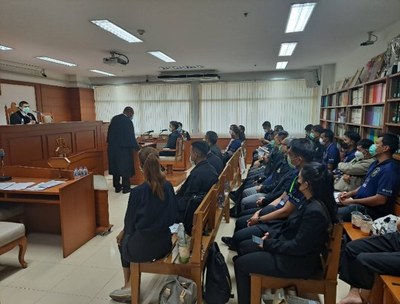USAID and Panthera hold first-of-its-kind CWT training in Thailand
While arrests for wildlife crimes have been steadily increasing across Asia, an overwhelming number of wildlife crime cases do not make it to court or do not result in conviction and sentencing. From April 25 to 29, 2022, USAID’s Reducing Demand for Wildlife partner Panthera organized a weeklong first-of-its-kind workshop in Thailand designed to support intelligence driven prosecution in counter wildlife trafficking investigations through a live mock trial. Participants included representatives from Thailand’s wildlife departments, police, customs, and immigration, and included arresting officers, investigating officers, intelligence officers, prosecutors, and judges. The event was supported by the U.S. Bureau of International Narcotics and Law Enforcement Affairs and the U.S. Department of Justice. The training was based on real life scenarios and convened a range of actors across the law enforcement, prosecution, and judiciary continuum to build networks, enhance coordination, and strengthen understanding about what is needed to put a strong case to court—-to increase the chances of successful prosecution and sentencing of wildlife crimes.
https://usaidrdw.org/news/all-news/1st-of-its-kind-cwt-training-in-thailand
https://usaidrdw.org/news/all-news/1st-of-its-kind-cwt-training-in-thailand/@@download/image/panthera.jpg
USAID and Panthera hold first-of-its-kind CWT training in Thailand
While arrests for wildlife crimes have been steadily increasing across Asia, an overwhelming number of wildlife crime cases do not make it to court or do not result in conviction and sentencing. From April 25 to 29, 2022, USAID’s Reducing Demand for Wildlife partner Panthera organized a weeklong first-of-its-kind workshop in Thailand designed to support intelligence driven prosecution in counter wildlife trafficking investigations through a live mock trial. Participants included representatives from Thailand’s wildlife departments, police, customs, and immigration, and included arresting officers, investigating officers, intelligence officers, prosecutors, and judges. The event was supported by the U.S. Bureau of International Narcotics and Law Enforcement Affairs and the U.S. Department of Justice. The training was based on real life scenarios and convened a range of actors across the law enforcement, prosecution, and judiciary continuum to build networks, enhance coordination, and strengthen understanding about what is needed to put a strong case to court—-to increase the chances of successful prosecution and sentencing of wildlife crimes.


